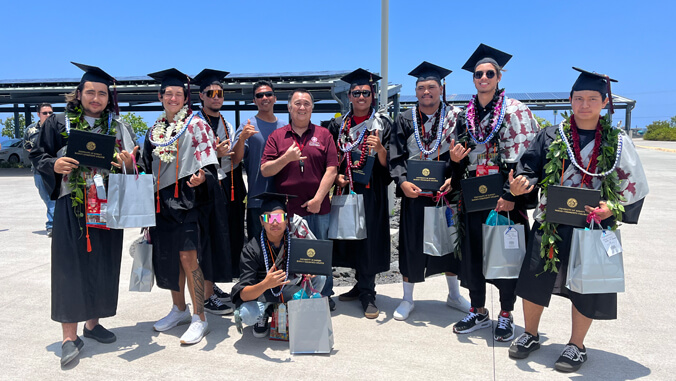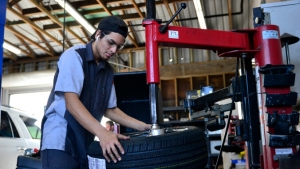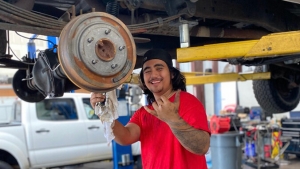
Eight Hawaiʻi Community College automotive mechanics technology students took the fast lane to graduation on May 14, as members of an innovative pilot program—the first of its kind in the State of Hawaiʻi. Just one year after high school, these students graduated from the Hawaiʻi Community College–Pālamanui in Kona with Associate of Applied Science (AAS) degrees in Automotive Mechanics Technology (AMT).
They now have college degrees and work experience, and are ready for a job market where there is strong local demand for their skills.

“It was a really great experience,” said graduate Titon Riveira. “I learned a lot of things, and it woke me up to the automotive world.”
The graduates were part of the Kealakehe High School (KHS) Automotive Mechanics Early College Pilot Program, which was launched in 2019 to meet the needs of local students and the Kona community.
The program helped Ken Takeishi attain a long-held goal.
“It came by really fast,” said Takeishi. “I’m excited though because I finally have a degree from college, and I always dreamed of having a degree from college.”
More highlights from the commencement ceremonies and our amazing graduates
The program is a partnership between Hawaiʻi P–20 Partnerships in Education, KHS, Hawaiʻi CC and Kona automotive businesses.
“This program is a creative solution that provides West Hawaiʻi youth with valuable training in a skilled trade while also supporting the needs of local businesses,” said Raynette “Kalei” Haleamau-Kam, director of Hawaiʻi CC–Pālamanui. “It was truly a community effort. Mahalo to everyone involved.”
Jump start in high school
The AMT Early College program gave these students a jump start on their college degrees while they were in high school. They began earning credits toward their college degrees in 2019 as juniors at KHS; they completed approximately half the degree requirements by the time they graduated from high school in 2021; and this past academic year, they completed their AAS degrees through a combination of work-based learning at Kona automotive shops and classes at Hawaiʻi CC–Pālamanui.

Early College classes—which allow high school students to take classes that satisfy requirements for both a high school diploma and a college degree—have become widespread in recent years. What makes the AMT Early College program unique is that it is Career and Technical Education (CTE) focused, is cohort-based, and prepares students for specific careers for which there is a demonstrated need in the community.
Hawaiʻi CC Chancellor Rachel Solemsaas said the AMT program is part of a growing trend at Hawaiʻi CC to offer more Early College CTE programs, in order to support Hawaiʻi Island’s high school seniors’ college and career plans.
“On the initial implementation of Early College, we noticed we were not reaching as many non-college-going high school students as we wanted,” said Solemsaas. “By offering Early College Career and Technical Education programs like Automotive Mechanics Technology to the high schools, we can reach a different population of students, who can see a college pathway is attainable for them, and provide a boost to their college and career journeys.”
In addition to the AMT students, 18 students from Kaʻū High School are receiving certificates in Agriculture from Hawaiʻi CC this year. Hawaiʻi CC’s Early Childhood Education program has also partnered with local high schools on the Early Learning Career Pathways Project, and there are conversations about adding more Early College pathways in carpentry and the culinary arts.
The ultimate goal, Solemsaas said, is to increase the rate at which Hawaiʻi Island high school graduates attend college and improve their career mobility by allowing them to earn degrees and certificates.
Collaboration key to success
Chris Ibarra, a KHS and Hawaiʻi CC Automotive Mechanics Instructor, said the Kona businesses were essential partners and gave students valuable experience.
“The businesses and relationships we made in the community were a big help, because the students got the full experience of a shop with the hands-on learning and added pressure that comes with it,” Ibarra said.
Funding for the partnership is supported by Hawaiʻi Community Foundation, GEAR UP Hawaiʻi, the Stupski Foundation, The Harry and Jeanette Weinberg Foundation, Hawaiʻi 3R’s and the Ēlama Project.
After Chase Fernandez received his Hawaiʻi CC diploma, the graduate gave a big mahalo to everyone involved.
“Thank you, everybody, for your support and trying to get us through this program,” said Fernandez. “I know it wasn’t easy. Much aloha to everyone who helped get us to this point.”
—By Thatcher J. P. Moats

